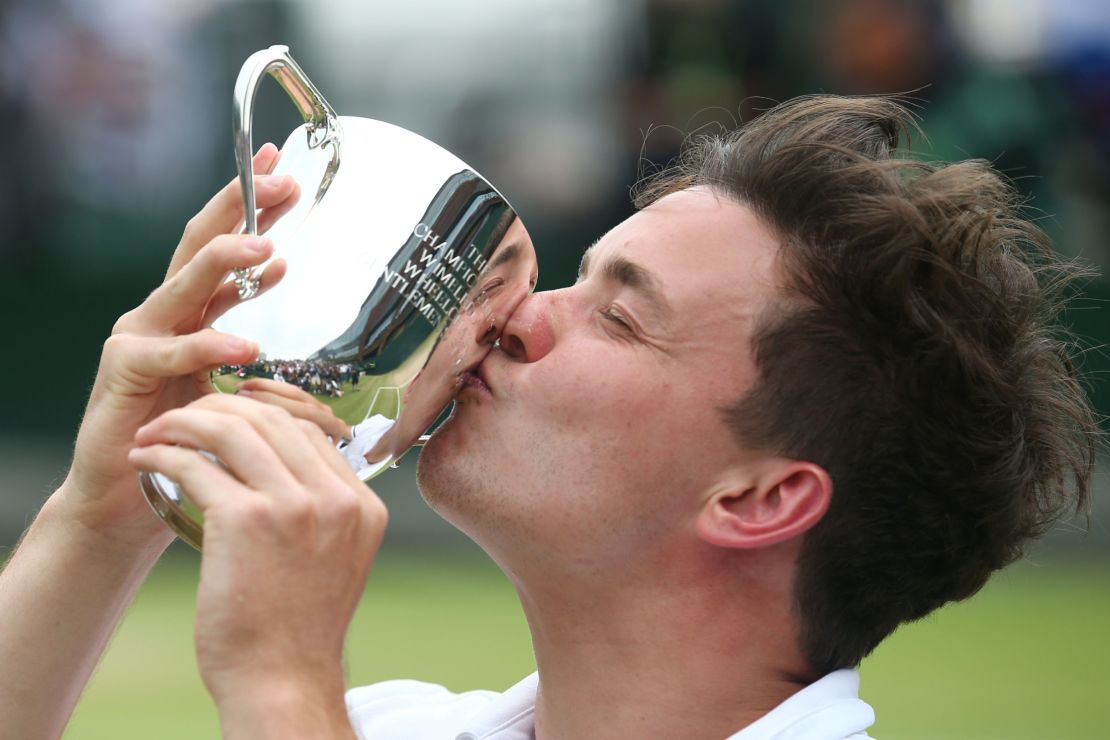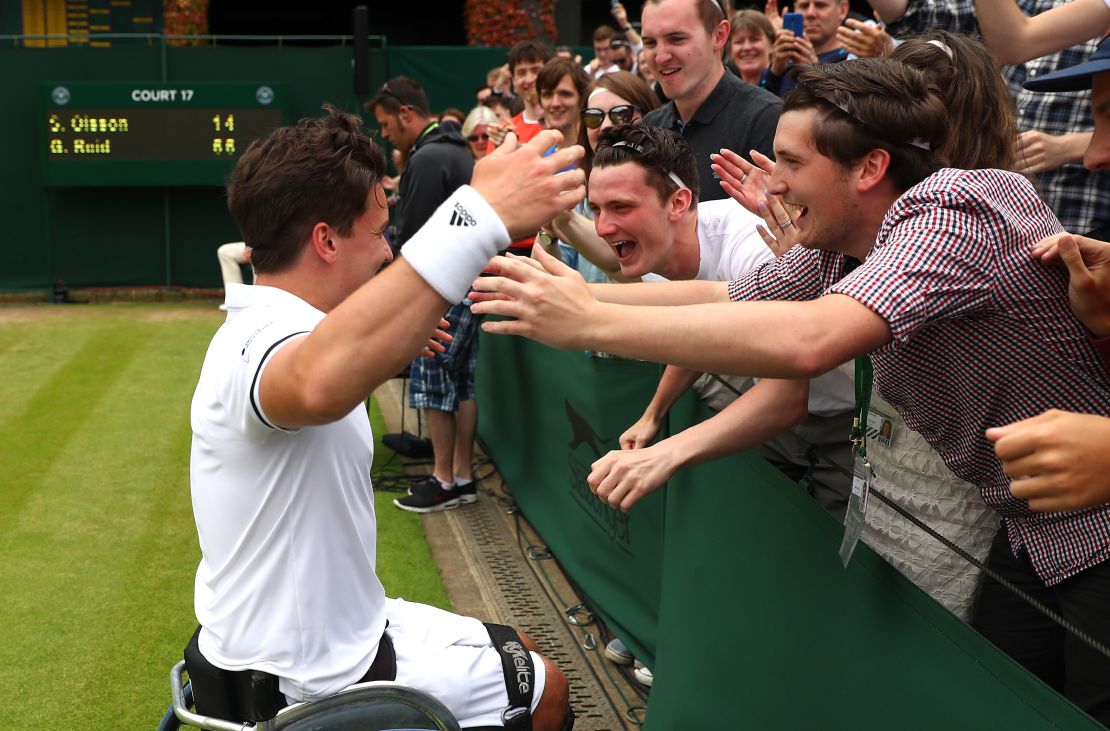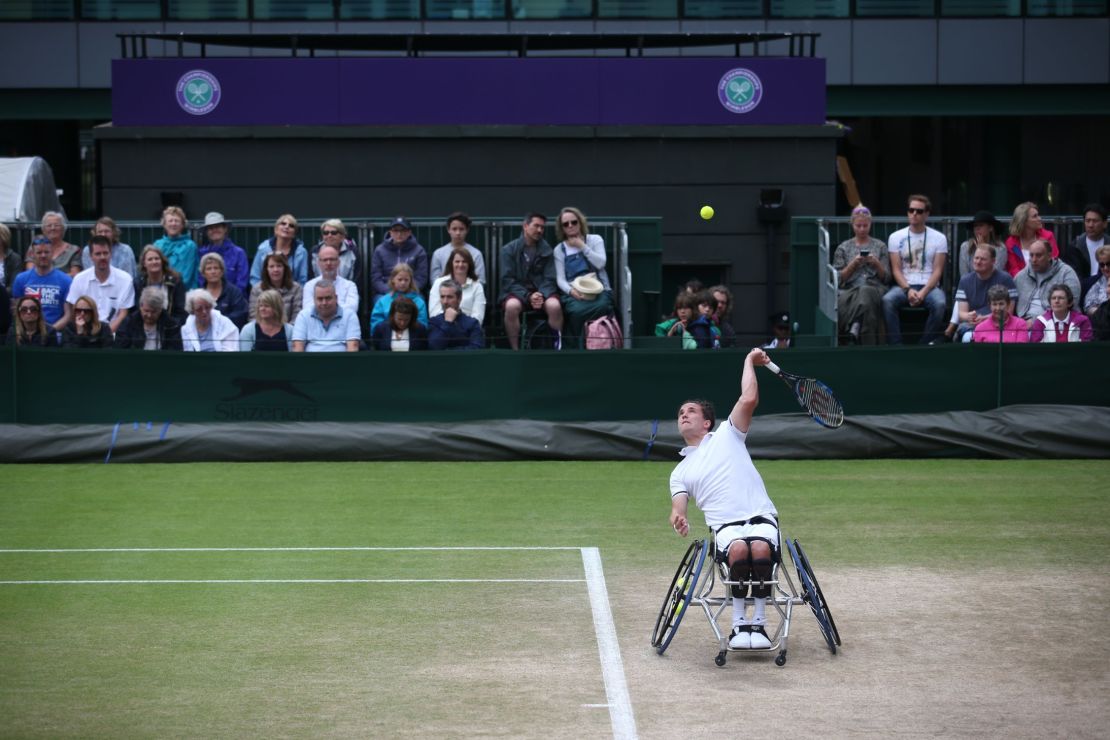Story highlights
Gordon Reid won two grand slams in 2016
Wheelchair tennis star bidding for Rio gold
Scot won Wimbledon wheelchair title
Gordon Reid may be looking to emulate fellow Scot Andy Murray by winning gold for Great Britain in Rio de Janeiro over the coming days, but the wheelchair tennis star admits it was another ace with a racket he grew up admiring.
“I have always been a huge fan of Roger Federer,” the 24-year-old Paralympian and No. 3 ranked wheelchair tennis player told CNN earlier this year. “I used to always love watching those battles with (Rafael) Nadal … (his) elegance on the court. He’s the one that I always look up to.”
Reid already has four grand slam titles to his name from 2016. He picked up the Australian Open singles crown in January before winning the French Open doubles title alongside playing partner Shingo Kunieda in June.
Read: Murderball and other reasons you should watch the Paralympics
Two more titles soon followed at Wimbledon as Reid scored victory in both the singles and doubles events. Reid had previously won the French and US Open doubles titles in 2015.
‘Terrifying’ news
But those triumphs built on the back of hard work, commitment and perseverance pale when compared to battles he faced earlier in his young life.

Reid was diagnosed with Transverse Myelitis – a rare neurological condition that can affect the spinal chord – when he was just 12 years old.
Although a time of great distress, he vividly recalls the moment it first began to dawn on him something was wrong. He was in his parent’s house, laughing and joking around with friends. When he tried to stand up, however, his legs buckled underneath him.
“I thought I just had bad cramp in the back of my legs,” he said. It wasn’t until later in the day when it became clear that “it was something a lot more serious … I couldn’t even make it out the driveway because I couldn’t stand up.”
Reid says it took doctors about a week to diagnose what was wrong. “I just remember, you know, being told by the doctors that I may never walk again … which was obviously quite a terrifying thing to be told when you’re that age.”
Hope through sport
Wheelchair tennis soon became a way to indulge Reid’s passion for sport in spite of his condition. He had played tennis with his brothers prior to being diagnosed with Transverse Myelitis but he was also a keen football player and fan of Glasgow club, Rangers.
READ: House of Cards star revels in US Open drama
“I think wheelchair tennis had a bit of a lower profile back then,” he said of the sport that was formalized by injured acrobatic skier, Brad Parks, back in the late 1970s. The game is played on a regular sized tennis court but instead of one bounce, the rules of wheelchair tennis state two bounces are allowed.
“I actually wasn’t aware of it even being a thing before I started playing myself,” Reid explained. “It was always a highlight of my week to go to training (and) see the guys up there.”
Courting success
Reid places a big emphasis on the love shown and help given by his family and friends over the years.
An abiding memory of winning his first singles grand slam at the Australian Open earlier this year was turning round to see friends who had traveled to watch him go “crazy in the stands, hugging each other and cheering at me,” he says.
A larger group made it from Scotland to Wimbledon later in the year. Although the All England Club has held a wheelchair tennis doubles event since 2001, this year marked the first time a singles competition has taken place there.

Reid surged forward to embrace his supporters upon winning the Wimbledon crown. Yet the joy, clear on his face and those of his fans in that moment, lay in the culmination of close to a decade’s work both on and off the court.
‘It means everything’
His strength and conditioning coach, Claire McDonald, has worked with him since he was 15-years-old. And despite the occasional tale of indiscipline or stroppiness when he was a teenager, she describes how Reid has matured into a focused, professional athlete.
“Gordon is fantastic to work with. He’s got such a good personality. He’s professional. His attitude is fantastic. I actually can’t fault him,” said McDonald.
“Wheelchair tennis is Gordon’s life. You see him so excited when he goes out to big tournaments. When he wins he’s on top of the world. It means everything to him,” she added.
Read: Are these the stars of the Paralympics 2016?
Anyone who watched Reid’s Wimbledon final with Sweden’s Stefan Olsson would find it hard to argue that the top level of wheelchair tennis is anything other than a top-class sporting pursuit.
From negative to positive
Yet away from the courts and locker rooms, Reid and his rivals often find time to discuss the shared experiences that brought them onto the wheelchair tennis tour.
“A lot of them have gone through similar experiences … had accidents or, you know, conditions through life,” Reid explained.
“Some people are born with disabilities but most of the people at the highest level in the sport would have some kind of an accident which has put them in the chair. We often have some deep conversation about life and the meaning of what happened to us if we changed it or if we would do anything differently.”

But for Reid, differing circumstances may have closed off the opportunities he has subsequently grabbed with both hands.
“You know, it has given me so many opportunities in life that I would never have (had) typically in tennis in the highest level – the grand slams and sharing my locker with Federer, (Andy) Murray and (Rafael) Nadal. And traveled the world when I am still 24 – been all over the place.”
McDonald perhaps best encapsulates this conundrum when she said that Reid has “taken a negative and turned it into a positive.”
A gold medal in Rio would certainly be another tick in the right box.


